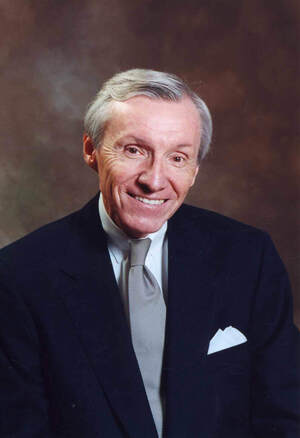Professor James Doppke ’57 would stride into the room at 7 p.m., his jacket and tie already removed, and slide the teacher’s chair closer to the rows of desks where we were seated. There he’d sit, cross his legs, sigh and smile, poised to entertain while educating us, as though he’d just gotten settled on the studio couch of The Tonight Show.
He would have fit in there, too. Imagine spending an evening in conversation with William Buckley, Dick Cavett and David Letterman. Doppke seemed to embody all three, possessing Buckley’s intellect, Cavett’s conversational intimacy, and Letterman’s humor.
In the late 1970s I was a rookie high school English teacher by day, pursuing my master’s degree at night at Chicago State University. That included Doppke’s three-hour Wednesday evening seminar on the modern novel. It was captivating.
So much so that one night, a fellow novice high school English teacher, John Dukach, walked in late, his white dress shirt covered in blood. Breathless, we stared at the bloodstains and listened as he explained how that afternoon a 15-year-old girl had tried to harm herself with a knife in his class. Dukach was able to intervene in time, wrestling away the weapon, restraining and calming the student until first responders arrived. Tragedy was averted.
During the class intermission, I asked Dukach why he didn’t take the night off after experiencing such trauma. “I was not about to let a stabbing cause me to miss Doppke’s class,” he said. I fully understood.

We were both in awe of the most talented and inspirational teacher either of us had ever encountered. The professor extraordinaire and president emeritus of the University of St. Francis in Joliet, Illinois, died December 3, 2023, at age 88.
His easygoing manner in the classroom belied the magic that he conjured for students, using only his mind. No pen, no book, no chalk. After sitting down he’d ask, as if it were just minutes, instead of seven days, since our class had met: “Where were we?”
When a young woman reminded him that he’d been answering a question the previous week about symbolism in The Sun Also Rises, posed by “that gentleman,” pointing at me, Doppke replied: “That’s no gentleman; that’s Mr. McGrath.” Admittedly, an old joke, but one we welcomed for the informal, convivial tone Doppke established in class. I felt I got a break from the higher education treadmill every Wednesday to indulge my love of literature. He reminded me why I was there.
Doppke’s legacy to us was the love of literary masterpieces, in which secondary sources, footnotes and biographies were optional, supplementary at best — subordinate, if not irrelevant, to the books’ sacred words he revered. He might spend an hour guiding us, like Socrates, to explore a unique word choice by F. Scott Fitzgerald inside a sentence uttered by Jay Gatsby, in order to elicit reader sympathy while foretelling Gatsby’s doom. Or demonstrate how to knife through a wisteria-choked sentence of Faulkner’s to extract the narrator’s hidden truth.
He tricked us budding English teachers into devising our own methods of inquiry for unlocking the joy and awe in any stanza or paragraph, which I, in turn, couldn’t wait to impart to my own students the very next day.
Erudite, eloquent and ebullient professors abound, of course. Doppke’s rare gift was that he valued making a human connection with each student as much, if not more, than creating a syllabus. During every class intermission, when Dukach and I traded war stories about teaching while we drank coffee and ate suspicious-looking sandwiches from the cafeteria’s vending machines, Doppke made the rounds. He would stop by our table and inquire about our jobs, our future plans and any problems we might be having. Then he’d share his own with candor, building a sense of camaraderie among peers — even if we didn’t feel like we belonged in the same company.
The degree to which his intermission kibitzing enhanced our classroom dynamic cannot be overstated. Doppke obviously knew its importance, particularly at a commuter university lacking the social and collegial opportunities afforded at a residential campus.
“It was the first time anyone made me feel like my own ideas were exotic and powerful,” Dukach said.
At one of those relaxed cafeteria chats, Doppke sympathized with Dukach and me about the real possibility of teacher burnout, which may explain why he later became an effective, understanding and empathic administrator, working the same spell on reluctant donors and outsized faculty egos, as he did on graduate students.
I tried to emulate Doppke in my own teaching career, but mostly failed, for the simple fact that I was never capable of magic. Like thousands of Illinois students and teachers, though, I will never forget the transformative spell cast by this generous and remarkable man.
David McGrath is author of the just released Far Enough Away, a collection of his work. His essay “Intimacies with Lake and Stream,” published here, was cited in Best American Essays 2022. Email him at mcgrathd@dupage.edu